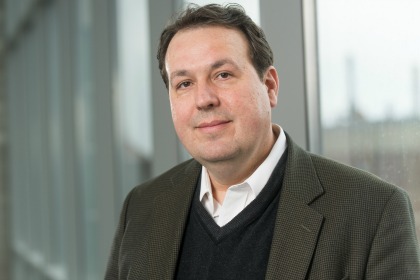David C. Rettew, M.D., is an associate professor and director of the Child & Adolescent Psychiatry Fellowship at the University of Vermont College of Medicine and a child psychiatrist and director of the Pediatric Psychiatry Clinic at the UVM Medical Center. He posted the following information about talking with children about mass shootings on the UVM Medical Center blog.

David Rettew, M.D., Associate Professor of Psychiatry and Pediatrics. (Photo: UVM COM Design & Photography)
David C. Rettew, M.D., is an associate professor and director of the Child & Adolescent Psychiatry Fellowship at the University of Vermont College of Medicine and a child psychiatrist and director of the Pediatric Psychiatry Clinic at the UVM Medical Center. He posted the following information about talking with children about mass shootings on the UVM Medical Center HealthSource blog.
Our community is once again reeling after the deadliest mass shooting in U.S. history. Our hearts go out to all the families and friends affected by this tragedy. Among the many questions that come up after events like this is how to talk about it with kids, if at all?
There is no universal answer to this, and of course parents need to trust their instincts when it comes to their own children. That said, here are a few guidelines that might be helpful in trying to think through the process.
Obviously, how you talk to your children depends upon their age and maturity level. Younger children may not need to know much about this event, if anything. They likely won’t have heard about it and, frankly, they don’t need to. Furthermore, if they have heard about it, they also will be quite likely to bring it up.
Older children, on the other hand, will probably have heard the news and it probably is good for parents to have a conversation with them so that they can hear things from a parent’s perspective. Many of these kids may not spontaneously bring up the topic on their own. For these children, a few of the following principles may be good to consider:
1. Start the conversation with questions rather than statements. This tip can also help you know how much they know about the shooting. Have you heard about what happened in Orlando? How did you hear? What are your friends saying about it? All of these starter questions can help open the dialogue and show your child that you want to listen as much as talk. It also can help you find potential myths or misconceptions about the events that need correction.
2. Remind kids that they are safe. It may not seem like it at times, but these kinds of horrible events remain very rare. It can be useful to remind children of this fact clearly without promising too much.
3. Refocus on the heroes. Many of us are naturally drawn to questions about the shooter, but it can be good to remember that in many tragedies there are heroes, such as first responders, who put their lives on the line for others. If older children want to talk more about the shooting, help them think about the helpers so that their attention isn’t drawn exclusively to the perpetrators.
4. Keep yourself in check. This tip doesn’t mean parents should be emotionally flat, but it is important to stay in control so that you can say and do what is going to be most helpful for your child.
5. Limit media exposure to the shooting. While it can be hard to resist, kids do not need to be watching 24 hour coverage of the shooting. In fact, it can make things worse and cause higher levels of anxiety. Waiting until after the kids go to sleep to get an update on the news is not going change what happened.
If your child doesn’t seem to have a lot to say, that’s fine and you probably don’t need to push it. A child’s lack of engagement in the discussion doesn’t necessarily mean that they are holding back a lot of emotions; they may just be focused more on other things. Opening the door for a conversation and demonstrating that you are willing and able to talk about this and other hard topics is a positive step in and of itself.
In many ways, these news stories can be harder on parents, who have the job of keeping their children safe, than for children themselves. Nevertheless, some kids, especially those who already struggle with anxiety, may need extra support and guidance. For parents looking for additional tips and information, a good source is the American Academy of Child and Adolescent Psychiatry.